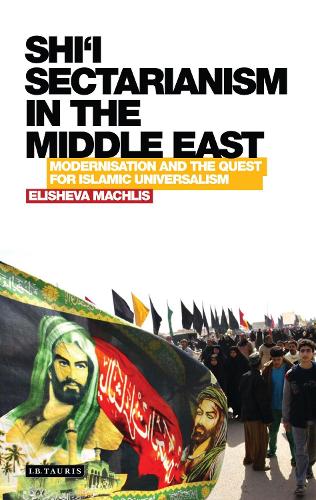
Shii Sectarianism in the Middle East: Modernisation and the Quest for Islamic Universalism
Publishing Details
Shii Sectarianism in the Middle East: Modernisation and the Quest for Islamic Universalism
By (Author) Elisheva Machlis
Bloomsbury Publishing PLC
I.B. Tauris
17th September 2014
United Kingdom
Classifications
Tertiary Education
Non Fiction
297.820956
Physical Properties
328
Width 138mm, Height 216mm
526g
Description
The eruption of violent sectarianism in Iraq following the US invasion in 2003 brought the question of Sunni-Shii relations in the country to the forefront of the international public agenda. It also strengthened the popular belief that contemporary Shi'ism is inherently sectarian. Yet several decades earlier, Ayatollah Khomeini had declared an Islamic revolution and downplayed its Shi'i origins and links. So what is the true orientation of Shii Islam in the contemporary era and how did modernisation alter its sectarian affiliation This book contends that early Shii reformist thought set the foundations for a more universal-oriented Shi'ism. Prominent reformists in the first half of the twentieth century from the holy cities of Karbala and Najaf in Iraq and from the Shii centres in Southern Lebanon played a significant role in the renewal of Shiism and laid the groundwork for its reinvention in the modern era. Exploring this shift towards a more ecumenical perception of Islam, Elisheva Machlis here provides a fresh perspective on inter-sectarian relations in contemporary Iraq and illuminates the intellectual roots of the Islamic revolution, by examining networks of Shi'i scholars such as Muammad usayn Kshif al-Ghi and Musin al-Amn al-mil, operating within a more globalised Muslim world. Drawing on the experiences of early Shii reformists, such as Abd al-usayn Sharaf al-Dn al-Msaw in Lebanon and Muammad Jawd Mughniyya in Damascus, this book gives new insight on the future of inter-Muslim relations at a time of growing inter-sectarian contention, from the Iran-Iraq war to the post-2003 Sunni-Shi'i conflict in Iraq and al-Qa'ida's anti-Shii message, taking into account questions of theology, historiography, jurisprudence and politics which all played a vital role in the transition to the contemporary era. The author here analyses the broad scholarly connections between Iran, Iraq and Lebanon in the twentieth century, while debating paramount questions of leadership, identity and group membership in the development of modern Shiism. Examining the relationship between intellectual thought and socio-political development in the region, this book provides a new perspective concerning the future of an increasingly globalised Muslim world and will prove essential reading for students and specialists.
Reviews
"Eisheva Machlis offers new and refreshing insights to Shii politics and intellectual activity in Iraq and Lebanon since World War One. In examining hitherto untapped sources, she skillfully analyzes how leading Shii scholars and political activists strove to break the boundaries of sectarianism and formulate broader Islamic universalism as well as harmonize modernity and science with religion. Machlis also sheds a new light on the links between these early reformist ideas and the universal Islamic message of the 1979 Iranian revolution. The book, which offers its readers with a rich and vibrant texture of Shii societies and thought, is essential to anyone interested in the history of Shiism, of Islam and of the history of Iraq and Lebanon." Meir Litvak, Director, the Alliance Center for Iranian Studies, Tel Aviv University, Israel "Elisheva Machlis is to be thanked for a meticulous and fascinating examination of the thought of Shii clerics in Iraq and in Lebanon as they came to terms with modernity in the 20th century. She demonstrates convincingly that these experiences stimulated reformist and activist thought, generating ideas hitherto unfamiliar in clerical circles. In the present century when sectarian division is so much part of the landscape in the region, it is encouraging to study the example of these Shii clerics who were open not only to nationalism and anti-colonialism, but also to a truly ecumenical project within the Muslim community, aiming to bridge the divide between Sunni and Shii Islam." Charles Tripp, SOAS, University of London, UK
Author Bio
Elisheva Machlis has a PhD from The Faculty of Asian and Middle Eastern Studies, Cambridge University, UK. She resides in Israel.
